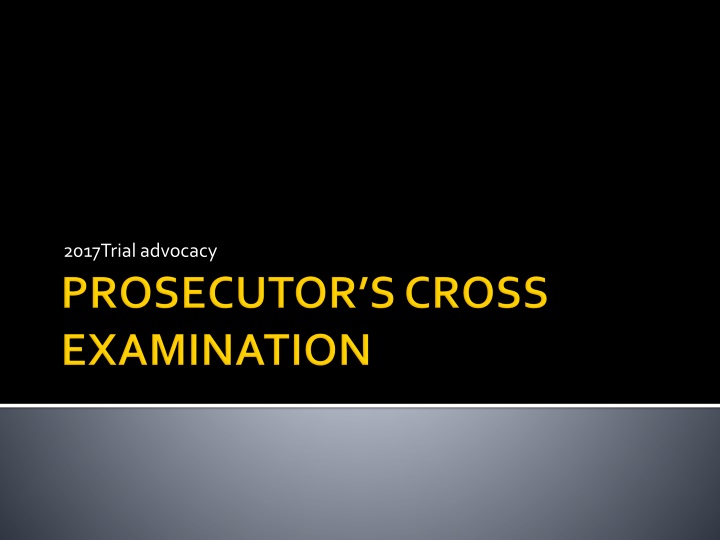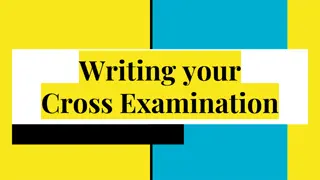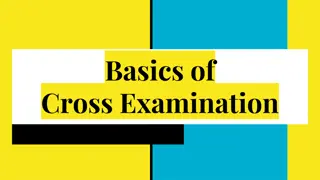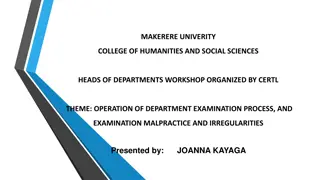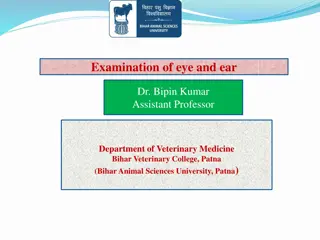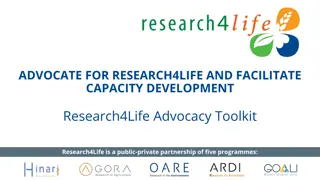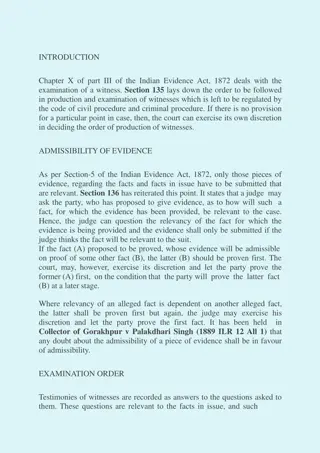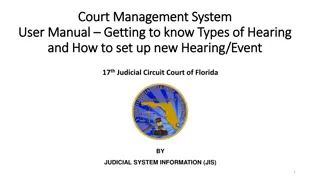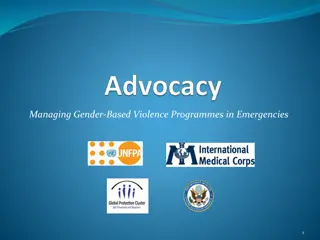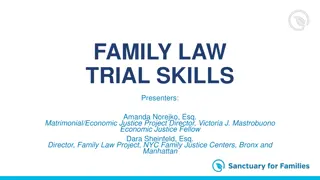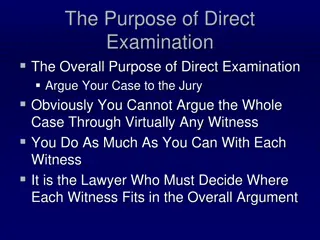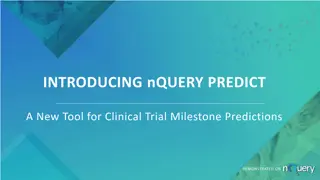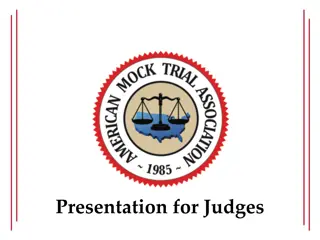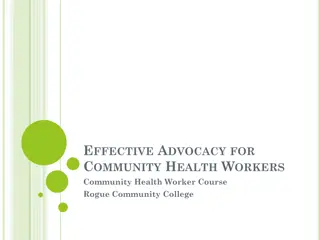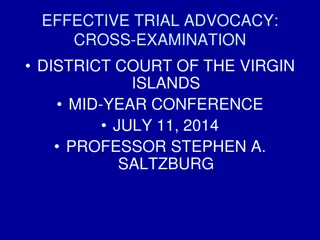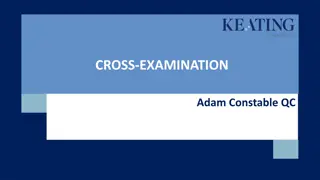Effective Cross-Examination Strategies in Trial Advocacy
Explore key techniques for cross-examination in trial advocacy, including researching defenses, engaging with witnesses, setting goals, and crafting effective questions to control the witness and present a compelling case. Emphasize building logical conclusions, sticking to facts, and achieving realistic goals to strengthen your advocacy skills.
Download Presentation

Please find below an Image/Link to download the presentation.
The content on the website is provided AS IS for your information and personal use only. It may not be sold, licensed, or shared on other websites without obtaining consent from the author.If you encounter any issues during the download, it is possible that the publisher has removed the file from their server.
You are allowed to download the files provided on this website for personal or commercial use, subject to the condition that they are used lawfully. All files are the property of their respective owners.
The content on the website is provided AS IS for your information and personal use only. It may not be sold, licensed, or shared on other websites without obtaining consent from the author.
E N D
Presentation Transcript
Research all defenses All defense witnesses Go and talk to defense witnesses with a prover Assess defense witnesses Try and draft cross before trial
Defense experts Alibi witnesses defendant s family members The defendant Ethical parameters
Do you cross at all Set limited goals Not going to win the case
Theory of the case Theory of the witness Goals for closing argument Review the instructions Ability to perceive recall Prior inconsistent statements Interest in the outcome
Defense theory Identification Wrong defendant Dui-wrong driver
Lying?why? Mistaken? How did he make this mistake? Fashion your cross to make this point
Argue Fight over small stuff Ask questions longer than seven words
Stick to the facts Build cross to logical conclusion Stop before the end save it for closing argument
Control the witness State facts witness must agree with Not trying to learn you re teaching Limit areas of cross Begin and end strong
Lead One fact per question No modifiers
Realistic goals Do you need to cross-examine at all? If so what is your theory? Stick with that
Your chance to testify Begin with constructive agreement Look to what witness did not do What doesn t make sense Save the why how so questions for closing
You dont need to ask Gives chance to explain Disagree with your closing argument So Why did I need to ask that question?
No one can disagree with you then Answer your own questions The best way possible
Commit Credit Confront
You just told the jury that the defendant was with you that evening correct Do not act like you believe this testimony Are you telling this jury today, the D was with you
This is not the first time you have spoken about that evening You spoke with an officer The night of the robbery He came to your home Asked you what you knew He was wearing a uniform Taking notes
Isnt it true you told the officer you had not seen the defendant for days? That s what you said
If witness was telling the truth You re using this for impeachment Just make the witness say he said it Be prepared to prove it up
The credit part adds: Prior sworn testimony Before the grand jury Court reporter Understood you were under oath On a day closer to the events
You were asked this question and you gave this answer: Q: Who did you see the night of the robbery? A: I was alone all night. Q: So you did not see the D that evening? A: Man, I hadn t seen him in days! Were you asked that question and did you give that answer?
Do not paraphrasewitness can deny making the statement Do not ask if either statement is true Do not ask were you lying then or are you lying now Get in get out argue the lie in close
Prepare Know the opinion The expert The applicable area of expertise Keep looking, ask, figure out theory of the witness hired gun, straight shooter
Attack qualifications Attack quality of basis information Attack method of analysis Impeach with prior statements Learned treatises Attack assumptions Expose bias
Attack qualifications Attack quality of basis information Attack method of analysis Impeach with prior statements Learned treatises Attack assumptions Expose bias
Qualificationsrarely successful, see James O Donnell, Dr. Pharm.
The Court finds that O'Donnell does not possess the qualifications to render a causation[**9] opinion in this case
243 F. Supp 672 3To be clear, the one-year Pharm.D. program that O'Donnell completed in 1971 was a degree in pharmacy, not pharmacology. Notably, O'Donnell admitted in his deposition that from approximately 1982 to 1985, he intentionally and falsely advertised that he possessed a doctorate in pharmacology in an attempt to attract more interest from lawyers for his consulting expert business. SeeO'Donnell Dep. at 21-22.
Check references Westlaw Google Call prior prosecutors Get transcripts Read articles
Limits of the opinion All the things the witness did not do All the things the witness does not know Brand new method? Bad data?
Copy of ad, web site The Care and feeding of an Expert Witness Number of times the witness testifies for the defense Percentage of income from testimony?
Control witness with: Facts Statements Prior testimony Learned treatises Assumptions witness made
Repeating direct Following organization of direct Open ended questions Long compound questions with long answers with selective information Failure to listen to answer
Not using opposing expert to Bolster your expert s background Bolstering your expert s methodology Validating written materials your expert relies on Points not focused Battle on experts turf stay on facts of your case Buying into opponent s view
Frontal attack on opinion Buying into opponent s view Not getting answers to your questions Showing you re frustrated with expert s answers in cross
Person Process Product
With a prover on the line Won t talk document Will talk what was she hired to do? What was she told by defense counsel? ask what information would change her opinion Ask her all her assumptions
Straight shooter Build up your expert Limited by information he was given Stick to the report What expert did not do
Prior transcripts For one side Ads in publications Cookie cutter opinions Computer search
Know the area of expertise Use your expert to identify weaknesses List of things he didn t do Keep it short he s been in court more than you have
Find learned treatises that disagree Read the latest material (carbon date the expert) Have your expert help you craft your questions
Subpoena all raw test data Think anti-social personality it almost always fits Information witness not given? (know this answer from interview, subpoena, defense discovery)
majority vote re diagnostic criteria Subjective data what patient tells the doctor Diagnoses change DSM-II Homosexuality was identified as mental disorder until 1973 vote
What he is relying on What he wasn t told Prior statement (transcripts, articles..) witness must admit Chicago punk rock documentary, entitled:
DUI expert Used tests himself Hundreds of times Some measure of sobriety Not a toxicologist Video is only two dimensional
Brainstorm closing argument Theory of witness Bias Mis-perception List all facts that support these theories Those are the facts to cross the alibi witness on
The crime happened Motive to commit crime? Defendant had opportunity to commit crime Witness wasn t watching the defendant the whole time
Create timeline First time this information revealed Tell it to anyone else? (find this out before asking) Relationship with defendant?
Built in impeachment Try and speak to witness Theory of witness Alibi witness fact witness character witness
